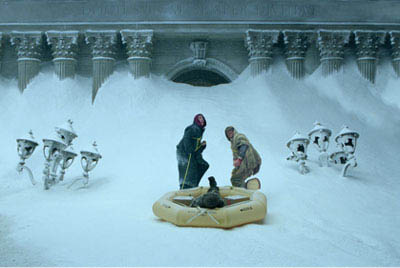
Objects floating in water experience buoyancy. Buoyancy is the name of the force opposing a boat's will to sink. When an object is immersed in water, it displaces water. If the weight of the water is more than the weight of the object, the object will be forced upward. This force is buoyancy.
If a wine cork were completely submerged under water, it would float back to the top of the water to a point of equilibrium--between the water and the air. Corks are able, because of their material, to displace their weight in water with just a portion of their volume. The remaining part of the cork stays above the water level. If you added weight to the cork, it would float lower in the water.

Balloons float in the air because of buoyancy. They displace air. If the weight of the air that they are displacing is heavier than the weight of the balloon, the balloon will rise to a level of equilibrium (where the weight of air displaced is EQUAL to the weight of the balloon.)
Some balloons are filled with helium gas. They float because the atoms of helium are lighter than the atoms of air (Nitrogen, Oxygen, Carbon dioxide, etc.). Some balloons are filled with hot air. Hot air molecules move faster and take up more space than cold air molecules (a lighter amount of air can take up the same amount of space as a heavier amount of air) so the hot air balloon is forced upwards.
 Hot air balloon beside a helium balloon
Hot air balloon beside a helium balloonWith this in mind, I would like to propose...The Vacuum Balloon. This would be a balloon shape filled with nothing...no helium, no hot-air. The only weight would be the skin of the balloon.
The problem I'm finding is that if the air is pumped out of an object, outside air pressure forces the object to collapse! Any ideas?


